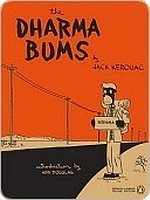Dharma Bums
Every so often I reflect on my work in the world and wonder if I’m on the right path. When big challenges arise and progress stalls, I fantasise about escaping it all, hitting the road beat poet style, and living in a way that has less duty and obligation, more dreaming than doing.
Yet I keep deciding to stay in suburbia, do my practice, love my family, go to work, grow my business, and do my best to be an upstanding citizen. I consider this my dharma. But I still like to pause and question my choices, check in with my motivations and get in touch with the freedom of being able to change direction if I find myself off course. My inner compass is set to moksha – liberation.
What is dharma? There are many translations, interpretations and definitions. The Sanskrit root word is ‘dhri’ meaning to hold, bear or support. The yogic cosmology underpinning the epic Mahabharata says that dharma is the force that keeps the planets in their rightful positions. It’s often taken to mean doing the right thing according to the laws of the land, culture and faith of your community. Some people see it as a call to a certain vocation. The dharma of fire is to burn. What is my dharma?
Unlike many people throughout history, a lot of us now have the relative freedom to choose our own path. Perhaps it’s that privilege that causes the ongoing dilemma of what to do when we grow up. I think everyone wants to be happy. And most people want to be productive. I really like Brene Brown’s idea that in a good life we might strive to ‘contribute more than we criticise’. So dharma can be interpreted to mean playing your part willingly, in good faith, committing your life’s energy towards roles and work that naturally arises before us.
What happens when following the expected path no longer feels right? Is it possible the dharma wheel can go off track? In the Bhagavad Gita, the introspective Arjuna is not feeling at ease with his role as warrior, yet Krishna advises him to act in accordance with his duty, saying something along the lines of ‘it is better to do one’s own dharma imperfectly than to do the dharma of another perfectly’. In other words, you do you.
In modern life, if we are fortunate enough to have gainful work, we no longer expect to stick to one job. Long gone are the days of loyalty to a boss or company, most people are mobile, and the pressures of rising living costs ensure that we are willing to leap at opportunities to advance our own careers rather than act for the benefit of an organisation. If your own business is no longer bringing happiness you can sell up, start again or restructure. Is this adharmic? Does it go against the flow of the cosmic order? Could it be a symptom of selfishness, a breach of aparigraha? Or has dharma changed to fit the time and place we live in, where it is wise to be a disrupter, nimble, responsive and adaptable?
One way to look at vocation is a career that suits your skills, that also has a fairly linear climb to the top of a ladder, where maximising income and power is the ultimate goal. In business growth is almost always considered a positive, everything’s a numbers game. Capitalism tells us loud and clear that we must do more, be more, achieve more, hustle more and buy more. This is in direct contrast to the yogic ideal of minimising ego and surrendering one’s individual desires to the cosmos.
Maybe the boom of yoga is linked to the push back against this outdated approach to life. For many people the expected career trajectory falls flat. Either promotions don’t arrive despite hard slog, or happiness and health are sacrificed to the stress of the rat race. Those who stick it out, committed to paying massive mortgages, putting kids through school and doing the ‘right and responsible’ thing frequently feel the need to compensate for their dissatisfaction by buying more stuff. Unhappy workers buy entertainment, toys, food, alcohol, holidays, all in a desperate quest to fill the ache their hearts where sensitivity used to be. The stress hormones have numbed them and they are reaching for pleasure wherever it can be found. Whether through burn out, illness or reflection, many people find themselves questioning the values that led them into such a fast paced, competitive approach to life. If they realise that contributing their talents and treading lightly matter, then feeling like a self medicating consumer rat is a major inner conflict.
That’s what yoga does to me. The practice reminds me that slow is plenty, that little is enough, and that the earth supports me. As my busy mind slows down, my heart truth is revealed. My dharma shows itself as a constant quest that’s gentle, flexible, and wandering. Yoga takes me into the flow of goodness where I can make decisions from wholesome intention. Arjuna stepped in to his discomfort and did his duty, but not without engaging in practice and deeply enquiring first.
Whether we choose to stay on the expected path, or break new ground, it is within our own nature to explore and define what our dharma is. Yoga can support us to ride the waves of uncertainty, and to take action that is aligned with our values. In this way yoga continues, as it did for people before us in different times and places, to foster our innate potential for lasting happiness and freedom. I still don’t know what I want to do when I grow up, but I know how I want to be and that’s internally free.
